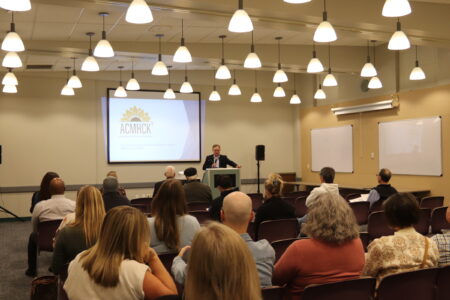Douglas County commissioners had several questions about additional funding requests from Bert Nash totaling over $2.3 million

photo by: Josie Heimsoth/Journal-World
Douglas County commissioners met for their first day of 2026 budget hearings on Monday, July 7, 2025.
Bert Nash Community Mental Health Center is seeking over $2.3 million in additional funding from Douglas County to maintain current service levels through 2026, but county commissioners raised several questions about the requests.
Bert Nash has faced financial difficulties in 2025 and is currently projected to end the year with a loss of approximately $2.1 million. A couple of weeks ago, former CEO Patrick Schmitz announced his immediate resignation, and Kirsten Watkins was appointed interim CEO the same day.
On the first day of the County Commission’s 2026 budget hearings Monday, commissioners highlighted the additional funding requests from the nonprofit. Bert Nash is requesting $500,000 in gap funding to address the challenges to its behavioral health services, specifically outpatient therapy services. There are also two other requests for additional funding for the Treatment & Recovery Center, with $604,305 in 2025 and $1,249,424 next year.
The $604,305 funding gap for 2025 is due to a drop in Medicaid reimbursement–from 55% to 53%–driven by more uninsured and underinsured patients, along with higher staffing needs. To maintain current services, Bert Nash is requesting a funding cap increase from $1.61 million to $2.22 million for 2025, and an additional $1,249,424 from the county to keep the TRC operating at its current level for 2026.
Commissioner Shannon Reid asked whether there had been any discussions about adjusting operations or the scope of outpatient services, rather than solely focusing on filling the funding gap to maintain current operations.
“I think part of the challenge is that our outpatient services, particularly adult individual therapy and psychiatric services are our highest requested services, the list of things our community members really want,” Watkins told commissioners on Monday, but said staff are continuing to evaluate the options for their programs moving forward.
Commissioner Karen Willey said that commissioners funded what was asked of them for the TRC in the 2024 budget cycle, and was told expenditures would remain consistent.
“And yet, there were sometime in that process 22 positions added, and then a different budget produced, and then a budget shortfall,” Willey said. “So how moving forward, do we communicate staff changes? We don’t expect changes outside our budget cycle … so it’s a huge change that wasn’t communicated.”
Watkins said those staffing changes are a reflection of the organization’s evolving understanding of running a crisis center. She said staffing ratios are needed in order to ensure safety for both staff and clients and may require more frequent discussion moving forward.
Commissioner Erica Anderson asked why the County Commission should consider the budget requests that were submitted by prior leadership.
“This is a challenging time for us,” Watkins said. ” … I have reviewed all the documents. I have a whole (executive) team here to support me today. We’ve had meetings in the last two weeks to ensure that the things that have been proposed are consistent again with our goals going forward and consistent with our understanding of the needs of those programs.”

photo by: Josie Heimsoth/Journal-World
Interim CEO of Bert Nash Kirsten Watkins is pictured at the Douglas County budget hearings on Monday, July 7, 2025.
HeadQuarters Kansas
HeadQuarters Kansas, which runs 24/7 crisis services via the 988 Lifeline and local lines, has revised its financial and operational practices after leadership changes last year and concerns about misused grant funds. Interim director Dan Watkins, appointed by a Douglas County judge, addressed commissioners Monday with two new funding requests to help with past expenses for 2024 and 2025.
One of the requests is $175,000 to help cover crisis line and suicide prevention services after losing $700,000 in expected 2024 funding from the Kansas Department for Aging and Disability Services and the county. The nonprofit, with a $4.3 million 2024 budget, depleted its reserves in 2024 and continued to do so in early 2025 due to ongoing funding shortfalls.
“HQ operated the Douglas County Crisis Line 24/7/365, and believes the requested $175,000 payment for that work was earned,” the supplemental request said.
In addition, the nonprofit is requesting $350,000 to supplement the 2025 budget – which is 8.5% of its $4.1 million budget for this year. According to the request, without this money, HeadQuarters Kansas will be faced with a $336,000 funding deficit by the end of the year.
Commissioner Patrick Kelly said the County Commission could not create a service agreement with HeadQuarters for continued crisis services in 2024, and asked Watkins, “what precedent would that set if organizations went ahead with things and we funded them on the back end?”
Dan Watkins said that it was understandable for the County Commission to pull out of that funding as the organization was experiencing financial turmoil, but regardless, staff continued to pick up the phone.
“(The county) continued to want the calls answered, but not necessarily to pay for it,” Watkins said. ” … I don’t see this as a bailout. I see it as payment for services that were provided as part of the overall crisis continuum.”
He said that the audit for 2021 wasn’t finalized until August 2023. The audits for 2022 and 2023 are still pending but are expected to be completed within the next couple of months. Additionally, the audit for 2024 is anticipated to be finished by October. He noted that the completion of these audits would provide a foundation for recruiting new board members.
Supportive housing projects
Tenants to Homeowners has had an ongoing partnership with Peaslee Tech and Dirt Works Studio at the University of Kansas to build small houses. Some are at 914 Ward St., and include solar panels, metal roofs and high-quality, multipurpose furniture to make them more affordable.
The organization is now seeking $500,000 to help build five additional small houses at 615 N. Third St. Rebecca Buford, executive director of Tenants to Homeowners, told commissioners that the location for the houses was previously purchased by the county with American Rescue Plan Act, or ARPA, funding, and the site is expected to fit 12 small homes.
Family Promise is also a new partner coming to the table in terms of requesting funds for supportive housing services. The organization is asking for $50,000 in additional funding to hire and sustain a full-time supportive housing case manager in 2026. The position will provide case management services to residents living in Ninth Street Missionary Baptist Church’s new transitional housing development and clients of the Cardinal Housing Network.
The request said if the county funded this request, Family Promise guarantees that 31 additional families will be served. Brenda Wahl, interim executive director of Family Promise, said the organization would use these funds for any surprises that may arise with the new endeavor.
“We just want to make sure that we have the funds we need in place in order to support all the programs that we’re operating,” Wahl said. ” … We just thought it would be a good time to partner with the county as we expand those services.”
What’s next?
Douglas County staff is proposing a $191.4 million budget for 2026 that keeps the property tax rate steady at 41.298 mills, where one mill equals $1 for every $1,000 of a property’s assessed value. Under this proposed rate, the county portion of the property tax bill would be $2,850 for a $600,000 home, $1,425 for a $300,000 home, and $950 for a $200,000 home.
The amount a property owner pays in taxes depends on both the mill levy and the assessed value of the property. This means that even if the tax rate stays the same or decreases, property owners may still see higher tax bills if their property values increase. In Douglas County, total assessed property values rose by 5.7% in 2025, following a 6.8% increase the year before.
The budget hearings will continue from 9 a.m. to noon on Tuesday, July 8, through Thursday, July 10, in the Douglas County Commission meeting room at 1100 Massachusetts St. If needed, Friday, July 11, has been set aside for additional hearings with departments requiring more time to meet with the County Commission.
On Tuesday, commissioners are expected to meet with the Sheriff’s Office, District Court, District Attorney, Kansas Holistic Defenders, K-State Research and Extension, historical societies and the Heritage Conservation Council, all of which have additional funding requests, as the Journal-World reported.
The public is welcome to attend in person or join virtually via Zoom, and no public comment will be taken during the hearings. Meeting details and recordings will be available on the county’s website. Budget deliberations are scheduled for Monday, July 14, at 9 a.m.
There will also be additional hearings for the five-year Capital Improvement Plan and Douglas County Consolidated Fire District No. 1, which are scheduled for 4 p.m. Wednesday, Aug. 6.
The County Commission is currently scheduled to adopt the 2026 budget during a public hearing at its regular business meeting on Wednesday, Aug. 27. People can read the full proposed 2026 budget on the Douglas County’s Budget and Finance webpage.







